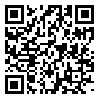Thu, Feb 5, 2026
[Archive]
Volume 8, Issue 3 (5-2018)
Iran J Ped Hematol Oncol 2018, 8(3): 166-171 |
Back to browse issues page
Download citation:
BibTeX | RIS | EndNote | Medlars | ProCite | Reference Manager | RefWorks
Send citation to:



BibTeX | RIS | EndNote | Medlars | ProCite | Reference Manager | RefWorks
Send citation to:
Nazmieh H, Soroush M, Farnia F, Habibian Z, Dehghan A S, Roozbeh M. Investigating the Effect of Senior Managers' Compliance in Reporting Nurses' Treatment Errors in Pediatric Wards. Iran J Ped Hematol Oncol 2018; 8 (3) :166-171
URL: http://ijpho.ssu.ac.ir/article-1-390-en.html
URL: http://ijpho.ssu.ac.ir/article-1-390-en.html
Hossein Nazmieh * 
 , Maryam Soroush
, Maryam Soroush 
 , Farahnaz Farnia
, Farahnaz Farnia 
 , Zarrin Habibian
, Zarrin Habibian 
 , Ashraf Sadat Dehghan
, Ashraf Sadat Dehghan 
 , Mehrdad Roozbeh
, Mehrdad Roozbeh 


 , Maryam Soroush
, Maryam Soroush 
 , Farahnaz Farnia
, Farahnaz Farnia 
 , Zarrin Habibian
, Zarrin Habibian 
 , Ashraf Sadat Dehghan
, Ashraf Sadat Dehghan 
 , Mehrdad Roozbeh
, Mehrdad Roozbeh 

Shahid Sadoughi Hospital, Shahid Sadoughi University of Medical Sciences and Health Services, Yazd, Iran
Abstract: (5279 Views)
Background: The occurrence of medical errors in therapeutic centers is important due to its critical nature in terms of health, patient safety, and notable clinical and economic outcomes. One of the solutions to manage this problem in the field of nursing is error reporting and recording. Error reporting, on one hand, improves patient care quality and safety and; on the other hand, provides valuable information to prevent future errors. Therefore, considering the importance of error reporting, the aim of this study was to determine the effect of senior managers' compliance in reporting nurses' treatment error in pediatric ward of Shahid Sadoughi Hospital in Yazd.
Materials and Methods: This interventional study included all nurses working in pediatric wards. The intervention was defined as various safety management drivers and encouragement of staff to report errors without any fears or concerns from senior managers. The error reports was recorded and comprised before and after intervention. For daat anlysis, SPSS (version 21) was run.
Results: Following the intervention, over the course of a year, a total of 327 errors were reported. With respect to wards, 36.9% of errors occurred in pediatric oncology ward, 40% in PICU, 25.6% in pediatrics, 8% in emergency department of pediatrics, and 15.9% in NICU. However, only 32 errors were reported during the last year. Data analysis indicated a significant increase in error reporting following the intervention (P-value = 0.021). Furthermore, the results showed that mostly errors occurred in morning shift. Considering the error type, medication error was the most frequent; and considering the reason, non-compliment with the principles of drug adminstration got the highest frequency.
Conclusion: The most important step in reducing errors is to eliminate the obstacles against reporting errors by creating a situation in which each nursing staff can honestly report his/her error. Therefore, regarding a significant difference before and after the intervention, it is recommended that senior managers consider medical treatment error reporting as their priorities.
Materials and Methods: This interventional study included all nurses working in pediatric wards. The intervention was defined as various safety management drivers and encouragement of staff to report errors without any fears or concerns from senior managers. The error reports was recorded and comprised before and after intervention. For daat anlysis, SPSS (version 21) was run.
Results: Following the intervention, over the course of a year, a total of 327 errors were reported. With respect to wards, 36.9% of errors occurred in pediatric oncology ward, 40% in PICU, 25.6% in pediatrics, 8% in emergency department of pediatrics, and 15.9% in NICU. However, only 32 errors were reported during the last year. Data analysis indicated a significant increase in error reporting following the intervention (P-value = 0.021). Furthermore, the results showed that mostly errors occurred in morning shift. Considering the error type, medication error was the most frequent; and considering the reason, non-compliment with the principles of drug adminstration got the highest frequency.
Conclusion: The most important step in reducing errors is to eliminate the obstacles against reporting errors by creating a situation in which each nursing staff can honestly report his/her error. Therefore, regarding a significant difference before and after the intervention, it is recommended that senior managers consider medical treatment error reporting as their priorities.
Type of Study: Research |
Subject:
Heart
Received: 2018/05/31 | Accepted: 2018/05/31 | Published: 2018/05/31
Received: 2018/05/31 | Accepted: 2018/05/31 | Published: 2018/05/31
| Rights and permissions | |
 |
This work is licensed under a Creative Commons Attribution-NonCommercial 4.0 International License. |

